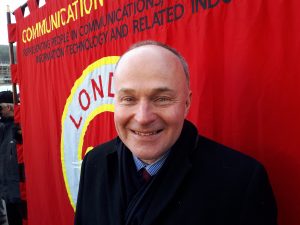‘Close the Gap’ hits Westminster
December 19 2017Phase Two of the CWU’s campaign to expose the second class treatment of around 2,000 Manpower employees working on the BT account began in earnest today (December 19) – with scores of CWU members congregating in Parliament Square to signal the start of a political onslaught that will intensify in the coming weeks and months.
The good natured protesters – including a number of the agency workers directly affected by the travesty of unequal pay for identical work – were joined on the landmark green by no fewer than eight Labour MPs who collectively delivered the message that the travesty of unequal pay for identical work is set to become one of the big political issues of 2018.
A Facebook Live session of this morning’s event – which can be viewed below – has already been watched by thousands and is now being shared far and wide on various social media channels.
Even before today’s Christmas-themed ‘occupation’ of Parliament Square, the Close the Gap campaign had already received the whole-hearted backing of Labour leader Jeremy Corbyn, prominent frontbenchers including Angela Rayner and Tom Watson, Scottish leader Richard Leonard and veteran Parliamentarian Dennis Skinner.
They were joined by a raft of constituency MPs and local councillors who pitched up outside BT call centres last month during the CWU’s Close the Gap ‘tour’ of no fewer than 16 BT call centres across the UK.
Amongst the MP’s supporting today’s Parliament Square protest was the CWU’s very own Hugh Gaffney who won the Coatbridge, Chryston and Bellshill constituency for Labour in June’s General Election. Hugh rallied the crowd with a heartfelt condemnation of a state of affairs where people working alongside each other conducting identical work can be paid vastly different salaries – all because of a legal loophole in the UK agency regulations.
“The price of a loaf is the same for everybody,” he pointed out. “Everybody deserves to be treated equally – and that is what we stand for in the trade union movement.”
That theme was amplified by CWU general secretary Dave Ward who pledged the CWU would take centre stage in the fight against insecure and exploitative employment practices that are fast becoming endemic.
“Consider what’s happening in Britain today,” said Dave. “You have a company like BT – one of the most profitable companies in the UK – which deliberately choses to exploit about 2,000 workers, condemning them to minimum wage pay, by exploiting a loophole in the Agency Workers Regulations.
“This is a company that made about £7.5 billion in profit last year and paid out around £1.5 billion to shareholders. These are incredible numbers and it would only take a drop in the ocean for BT to put this right.
“It really does illustrate what’s wrong in the world of work in this country today.”
Deputy general secretary (telecoms & financial services) Andy Kerr added: “This is not just about our members – it’s about the million agency workers all over the UK working in these conditions.
“It’s scandalous that in this day and age workers are still being exploited like this – and that’s why the second phase of the Close the Gap campaign is about getting politicians on board – because what we need are the Agency Worker Regulations amended in Parliament.”
Speaking as this morning’s Parliament Square event drew to a close, assistant secretary Sally Bridge, who has spearheaded successive campaigns on behalf of agency workers in BT over the past decade, stressed she was delighted at not just the turnout but also the attendance of a number of agency workers who had travelled to Westminster for specially arranged meetings with their local MPs.
“This campaign has resonated with not just our members in Manpower and BT but is now a wider campaign,” she stressed.
“Today we’ve launched Phase Two of the Close the Gap campaign, taking it right to the heart of Westminster. This afternoon we are meeting with more MPs and will be taking one of the agency workers on a PBA (pay between assignment) contract into the Central Lobby where we will be talking about what it is like to be working for £7.50 an hour when many of those around you are earning £4 an hour more for doing exactly the same work.
“With the Labour Party already on board, and even two Government select committees now apparently reaching the conclusion that the so-called ‘Swedish Derogation’ is a travesty, we will be really ratcheting up this campaign over the coming weeks and months so we can mobilise as much political support for change as possible.
“We know we have prominent MPs who are willing to take up the cause and speak openly in the House about the need for PBA contracts to be banished into oblivion where they belong.”
Human face of exploitation
The blatant injustice of unequal treatment on pay that the Close the Gap campaign is all about was laid bare at the Westminster event by the participation of Manpower members who’d travelled specially to London to give MPs a first hand account of what it feels like to be paid far less than directly employee colleagues doing exactly the same job.
Paul Slodczyk, who works in BT’s Lincoln call centre, is paid just £7.50 an hour under his PBA contract when many of his directly employed colleagues receive around £10 an hour – a pay gap that equates to around £6,000 a year.
“It makes you feel low and it’s a bit degrading in my opinion,” he explains. “I do exactly the same job and, although standards differ between people, I know I do my job to a good standard and I don’t see why I should get paid considerably less for the same work.”
For Paul, the lower pay he receives means that expensive times such as Christmas can be especially stressful. “I’m consistently having to pick up extra shifts and overtime, having no life really outside of work. Scraping by on a wage that isn’t even mediocre for what we do isn’t really living, it’s existing – always having to say ‘I can’t afford this or that’,” he explains.
“I try to do as many hours as I can just to get enough, especially at times like Christmas so I can get good present for my partner rather than having to say ‘I’m sorry but I don’t earn enough to give you something that I really want you to have.’
“I really hope we can make things change because any extra money would make a big difference – maybe having a holiday or treating my partner rather than it always being her having to pay for the more expensive things. More money would mean being able to have a life outside work, being able to visit more places and being able to use my wages for more than just paying the bills, then waiting for the next pay cheque so I can pay the next bills after that.”

Beth Elstob, who works at BT’s Gosforth call centre, poignantly articulated the sense of injustice that stems from “doing exactly the same job” as directly employed colleagues “but coming out with an income that doesn’t support day -to-day life.”
Beth continued: “I’m on £8 per hour, but I believe the BT people I work with are starting on around £19,000 a year – so it’s a big difference.
“Recently I had to move back to my parents’ house because I was struggling with bills. I just about covered them but had no life at all. I wasn’t able to do anything that everyone else was doing – I didn’t even have a holiday last year.
“It’s just working to pay bills and knowing you can’t have any luxuries.
“I think BT and Manpower should stop blaming each other and focus on the problem for the sake of staff that are being treating unfairly.”
Long-term Beth would love to be able to consider moving to a home of her own, but sees little prospect of that ever being achievable unless the double whammy of low agency pay and the perceived insecurity of even long-term agency work is addressed.
“I’ve been in my current role for three years, so technically it’s a stable job, but I know I wouldn’t even be considered for a mortgage or finance,” she concludes.

Andrew Davis, a Manpower employee at BT’s Liverpool call centre had a similar story , with his own hopes of independence thwarted by low pay.
“I’m living at home with my parents at the moment and even now I’m struggling to make ends meet,” he explains.
“Colleagues on BT contracts sitting next to us are doing exactly the same job but getting a lot more money at the end of the day. They can go on holidays and get mortgages – something that we can’t afford to do as Manpower employees because we’re basically on the minimum wage.”
That message was certainly not lost on all the MPs hearing it. John Grogan, Labour MP for Keighley stressed that “while the issue being highlighted today is important in itself it is symbolic of what’s going on across the economy.”
He continued: “Big companies are getting in agency workers using the Swedish Derogation, which I can remember talking about ten years ago, and it has taken a decade to move opinion to where we now have a couple of important Select Committees and the Taylor Review saying it needs to go.

“Today is an illustration of why it should go. It’s unacceptable that people working together are on vastly different rates of pay and I’m looking forward to opportunities to raise this in the House in the New Year.

Assistant secretary Sally Bridge concludes: “I do hope BT have been watching – be it the sessions on Facebook Live , the tweets on Twitter or the articles in The Voice, because if they do so they will be left under no illusion about the passion people have about this campaign.
“The CWU has been campaigning on this issue for a long time and we’re certainly not going to give it up now. We’re going to win this campaign, and BT should do the right thing by these people now.”
- A detailed round-up of last month’s Close the Gap tour will appear in the next issue of The Voice.

